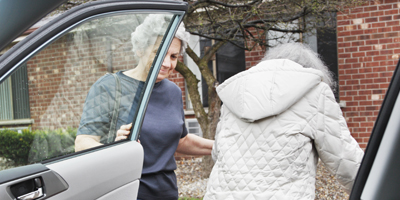In-Home Care
In-home care includes a wide range of services provided in the home, rather than in a hospital or care community. It can allow a person with Alzheimer's or other dementia to stay in his or her own home. It also can be of great assistance to caregivers.
Types of in-home services
 Not all in-home services are the same. Some in-home services provide non-medical help, such as assistance with daily living. Other in-home services involve medical care given by a licensed health professional, such as a nurse or physical therapist.
Not all in-home services are the same. Some in-home services provide non-medical help, such as assistance with daily living. Other in-home services involve medical care given by a licensed health professional, such as a nurse or physical therapist.Common types of in-home services:
- Companion services: Help with supervision, recreational activities or visiting.
- Personal care services: Help with bathing, dressing, toileting, eating, exercising or other personal care.
- Homemaker services: Help with housekeeping, shopping or meal preparation.
- Skilled care: Help with wound care, injections, physical therapy and other medical needs by a licensed health professional. Often times, a home health care agency coordinates these types of skilled care services once they have been ordered by a physician.
Finding in-home services
- Talk to the doctor. The primary physician providing care for the person with Alzheimer's is a great place to start. Ask for recommendations of home health providers that have experience caring for people with dementia.
- Use Medicare's online tool. You can find and compare Medicare-certified Home Health agencies in your area through Medicare's online tool Home Health Compare.
- Use our Community Resource Finder. Search for home care services near you by using online Community Resource Finder.
- Call your local Alzheimer's Association chapter. The Alzheimer's Association chapter in your area can provide additional guidance. Find your local Alzheimer's Association chapter.
- Use The Eldercare Locator. Call 800.677.1116 or use the Eldercare Locator Online Tool, where you can search for services by zip code, city or state.
- Ask friends, family and neighbors about their experiences. Getting a first-hand opinion from someone who has used in-home care services can be especially helpful.
Home Safety Checklist
Download, print and keep the checklist handy to prevent dangerous situations and help maximize the person living with dementia's independence for as long as possible.
Choosing providers
The following steps can be helpful when trying to find the right care:
- Create a list of care needs. Before contacting prospective providers, create a list of care needs, as well as your expectations on how these needs will be met.
- Call first. When you call to screen home care providers, find out what kind of help they offer and if it meets your specific needs.
- Interview at home. Meet with a prospective home care agency or provider in your home. Prepare questions beforehand. It's a good idea to have a third person present so that afterwards you can discuss your impressions.
- Check references. Some agencies will conduct criminal background checks. Ask if these have been conducted. It is also a good idea to talk to others who have worked with the provider.
- Share information. The more care providers know about the person they are caring for, the better care they can give. Even with memory loss, persons with dementia maintain strong memories from periods of their past. Familiarize the care provider with past accomplishments, fond memories and other guideposts that are relevant to where the person with dementia's current memory is strong. It will allow for a much greater bond to form between them. Our Personal Facts and Insights (PDF) form can help you organize and share information about the person's personal preferences and background.
Questions to ask potential in-home providers
- Are you trained in first aid and CPR?
-
Do you have experience working with someone with dementia?
-
Are you trained in dementia care?
-
Are you with an agency? (If important to you)
-
Are you bonded (protects clients from potential losses caused by the employee)?
-
Are you able to provide references?
-
Are you available at the times needed?
-
Are you able to provide back-up, if sick?
-
Are you able to manage our specific health and behavioral care needs?
Costs
Costs for home care services vary depending on many factors, including what services are being provided, where you live, and whether the expenses qualify for Medicare or private insurance coverage.
Medicare covers certain in-home health care services when the person needing care meets eligibility criteria (which includes being homebound and requiring the services of a skilled professional), and if the services are considered reasonable and necessary for treatment. For details about eligibility, download the Centers for Medicare and Medicaid Services booklet Medicare and Home Health Care (PDF).
Learn more: To find and compare Medicare-certified home health agencies in your area, use Medicare's online tool Home Health Compare.
Cash assistance programs
Some states have programs for seniors with limited resources and assets, which — rather than going through a home health care agency — allow seniors (or their representatives) to pay a person of their choosing, including family members, for in-home services. Such programs are often called "participant-directed services" or "cash and counseling," although similar services go by different names depending on location.
To learn if a cash assistance program for home-health services exists in your state, contact your local Area Agency on Aging through their website or The Eldercare Locator (800.677.1116 | www.eldercare.gov).
Related Pages

Connect with our free, online caregiver community.
Join ALZConnected
Our blog is a place to continue the conversation about Alzheimer's.
Read the Blog




